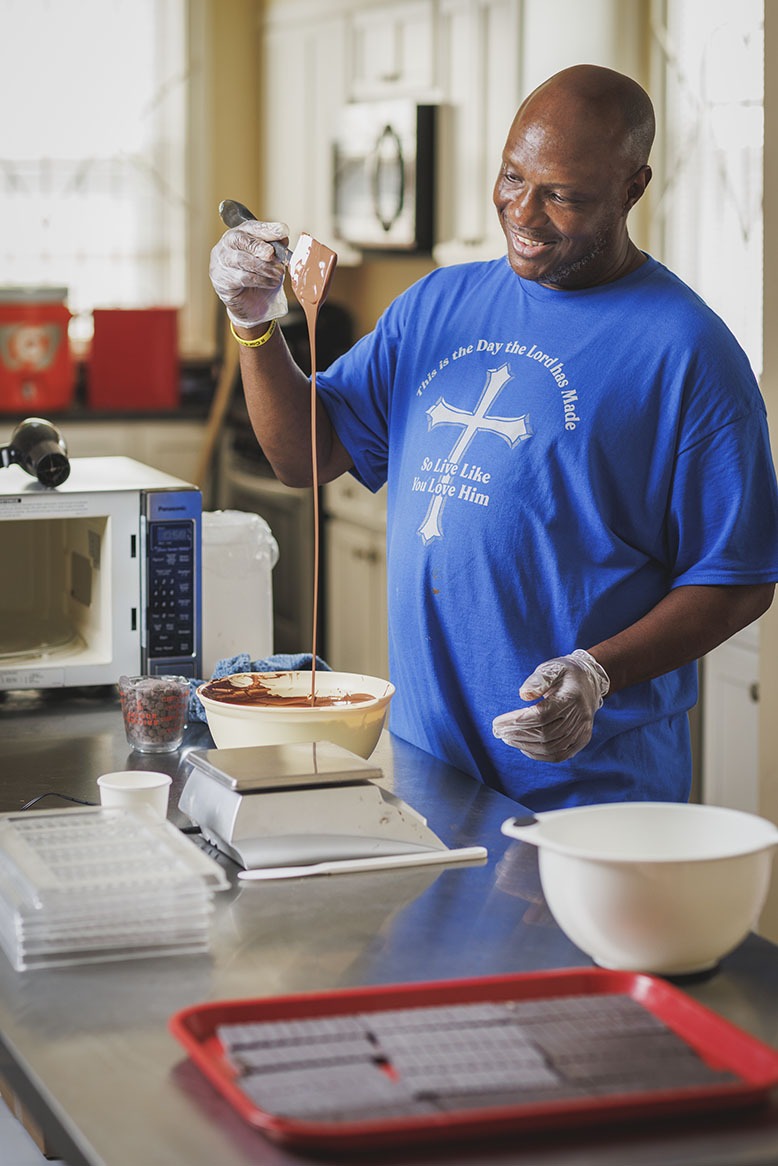
Seeds of Hope Ministries student Rubbins St. Louis makes chocolate bars each day as part of a prison-to-work program called Hope Chocolate. Photo courtesy of Matt Stanley
Finding work with a prison record often presents a challenge, but a unique project launched by a Camden nonprofit is creating opportunities for people returning to the workforce by teaching them a new skill: handcrafting high-quality chocolate bars.
Seeds of Hope Ministries enrolled its first student, Rubbins St. Louis, the same day he completed a decade-long prison term.
His teacher, Bruce Smith of Marlton, worked in the chocolate industry for more than half a century and came up with the idea. The chocolate project, known as Hope Chocolate, started in January 2021 and is a practical solution for ex-offenders, says Smith. The formerly incarcerated, he notes, are often “neglected, abused and disrespected, and many struggle for the rest of their lives to find gainful employment.”
When St. Louis, 55, arrived at Seeds of Hope, he brought with him not only a prison record, but also a long history of battling drug addiction and selling illegal drugs.
Bill Antinore, the founder of Seeds of Hope, offered St. Louis a bedroom in one of the ministry’s four Camden houses, along with the opportunity to complete the paid chocolate internship. St. Louis accepted the offer and agreed to ongoing counseling, which is required as part of the training.
His commute to work each morning is just down the stairs from his bedroom to a dedicated space where he makes milk and dark bars, called Hope Bars.
St. Louis’s first batch of 80 Hope Chocolate bars was for Morning Glori Farmette, an alpaca farm in Marlton, for which he made chocolates shaped like alpacas to be sold to visitors. He also made 150 chocolate hearts for Bethel Baptist Church in Cherry Hill.
The project’s long-term goal, says Smith, is to sell chocolate bars in bulk to organizations wishing to resell them as fundraisers. Antinore is seeking volunteers to help find buyers and distribute the product. Once St. Louis completes the program, they will begin rolling it out for more students. They will also help the students find jobs in the industry once they are done with the project, which lasts around six months.
Seeds of Hope’s work is funded solely by donations from about 15 churches and individuals who believe in the organization’s mission. It has worked with various state and federal prisons and local halfway houses since 2000.
“We’re not going to set the world on fire with these chocolates,” says Antinore. “Our goal is to bring ex-offenders to Christ while teaching them a valuable skill.”



